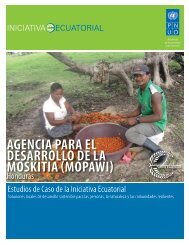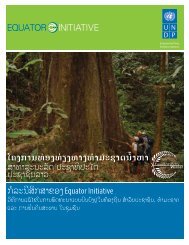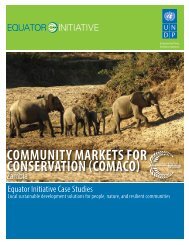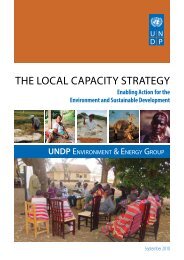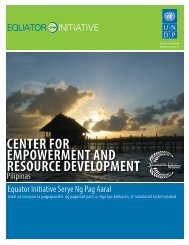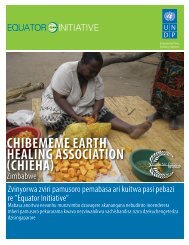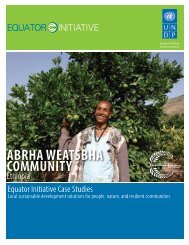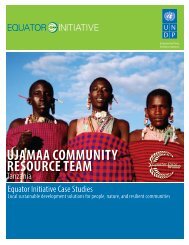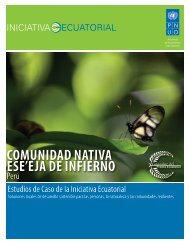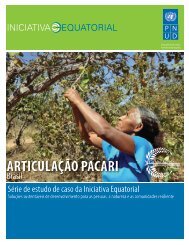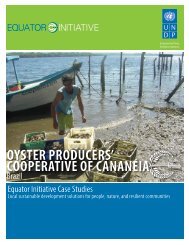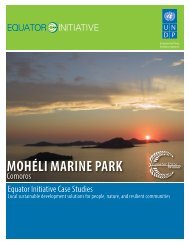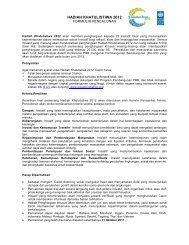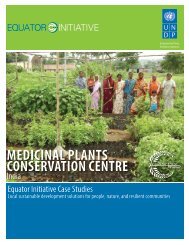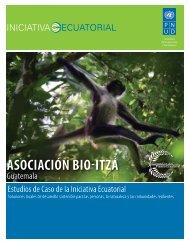INDIGENOUS TOURISM NETWORK OF MEXICO - Equator Initiative
INDIGENOUS TOURISM NETWORK OF MEXICO - Equator Initiative
INDIGENOUS TOURISM NETWORK OF MEXICO - Equator Initiative
Create successful ePaper yourself
Turn your PDF publications into a flip-book with our unique Google optimized e-Paper software.
Sustainability and Replication<br />
SUSTAINABILITY<br />
Since its establishment, RITA has sustained its growth on a<br />
foundation of credibility and service to its members. The key element<br />
contributing to the sustainability of the initiative is its people.<br />
Traditional indigenous livelihoods have always been sustainable<br />
and their enhanced capacity to deal with administrative, legal and<br />
commercial challenges has given them the ability to adapt to change<br />
and overcome competition successfully. RITA’s next step is to focus<br />
on strengthening the protection of the environment. Currently,<br />
there is a shift towards environmental education in the work of RITA’s<br />
member microenterprises. Indigenous people, with their wealth of<br />
local knowledge, are the best providors of this training.<br />
One of RITA’s weaknesses in maintaining sustainability pertains<br />
to the establishment of marketing systems in order to provide<br />
a continuous flow of visitors. While RITA has begun to take action<br />
to market their members’ tourism services through brochures and<br />
websites, more work in this area is needed. Financial stability is also<br />
an issue, as RITA now acts as a socially-based network, rather than a<br />
consultant as it did formerly. Consequently, RITA must find resources<br />
to operate and strengthen the network’s infrastructure and capacity.<br />
Some of RITA’s financial issues were alleviated in 2009, when RITA<br />
applied for financing from the Inter-American Development Bank<br />
for a project entitled ‘Consolidation of a Network of Indigenous<br />
Microenterprises through the Enhancement of Regional Tourism’.<br />
The project was approved for an amount of USD 149,662, with an<br />
additional USD 91,208 coming from national co-financing, achieving<br />
total project funding of USD 240,870. The purpose of this project is<br />
for RITA’s member companies to develop a uniform system of tourism<br />
services and promotion of their attractions, while maintaining the<br />
regional identity of each microenterprise.<br />
REPLICATION<br />
As mentioned previously, while the RITA network began with 32<br />
member companies in 2002, the number has since grown to 160,<br />
with 13 regional sub-networks now in operation. RITA has also<br />
shared its experiences with various groups at both the national and<br />
continental levels in order to facilitate the development of similar<br />
initiatives in other regions and countries.<br />
RITA has provided the basis for the creation of the Indigenous Tourism<br />
Network of the Americas, a network sponsored by the University<br />
“Indigenous communities’ way of life and work offer an alternative way of living to the<br />
demands of modern economies, characterized by a common cause and coexistence with their<br />
peers and their natural environment. This is a proven path, and has brought indigenous people<br />
centuries of peace and satisfaction; politicians should consider this, to promote harmonious<br />
relations between different groups in society.”<br />
Cecilio Solís, RITA<br />
11



